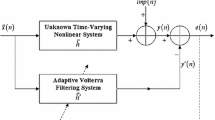Abstract
Nonlinear adaptive filtering techniques for system identification (based on the Volterra model) are widely used for the identification of nonlinearities in many applications. In this correspondence, the improved tracking capability of a numeric variable forgetting factor recursive least squares (NVFF-RLS) algorithm is presented for first-order and second-order time-varying Volterra systems under a nonstationary environment. The nonlinear system tracking problem is converted into a state estimation problem of the time-variant system. The time-varying Volterra kernels are governed by the first-order Gauss–Markov stochastic difference equation, upon which the state-space representation of this system is built. In comparison to the conventional fixed forgetting factor recursive least squares algorithm, the NVFF-RLS algorithm provides better channel estimation as well as channel tracking performance in terms of the minimum mean square error (MMSE) for first-order and second-order Volterra systems. The NVFF-RLS algorithm is adapted to the time-varying signals by using the updating prediction error criterion, which accounts for the nonstationarity of the signal. The demonstrated simulation results manifest that the proposed method has good adaptability in the time-varying environment, and it also reduces the computational complexity.





Similar content being viewed by others
References
A. Benveniste, Design of adaptive algorithms for the tracking of time varying systems. Int. J. Adapt. Control Signal Process. 1(1), 3–29 (1987)
Y.S. Cho, S.B. Kim, E.J. Powers, Time-frequency analysis using AR models with variable forgetting factors, in Proc. of ICASSP’90 (1990), pp. 2479–2482
Y.S. Cho, S.B. Kim, E.J. Powers, Time-varying spectral estimation using AR models with variable forgetting factor. IEEE Trans. Signal Process. 39(6), 1422–1426 (1991)
D. Clarke, P.J. Gawthorp, Self-tuning controller. Proc. Inst. Electr. Eng. 122, 929–934 (1975)
A. Gupta, Performance evaluation of adaptive polynomial filtering algorithms for time-varying parameter estimation. M. Eng. Dissertation, Thapar University, Patiala, India, 2011
S. Haykin, Adaptive Filter Theory, 4th edn. (Prentice-Hall, New York, 2002)
T. Koh, E.J. Powers, Second-order Volterra filtering and its application to nonlinear system identification. IEEE Trans. Acoust. Speech Signal Process. 33(6), 1445–1455 (1985)
A.K. Kohli, Fading model for antenna array receiver for a ring-type cluster of scatterers. Int. J. Electron. 98(7), 933–940 (2011)
A.K. Kohli, D.K. Mehra, Tracking of time-varying channels using two-step LMS-type adaptive algorithm. IEEE Trans. Signal Process. 54(7), 2606–2615 (2006)
A.K. Kohli, A. Rai, M.K. Patel, Variable forgetting factor LS algorithm for polynomial channel model. ISRN Signal Process. 2011, 1–4 (2011)
S. Leung, C.F. So, Gradient-based variable forgetting factor RLS algorithm in time-varying environments. IEEE Trans. Signal Process. 53(8), 3141–3150 (2005)
C. Paleologu, J. Benesty, S. Ciochina, A robust variable forgetting factor recursive least-squares algorithm for system identification. IEEE Signal Process. Lett. 15, 597–600 (2008)
M. Schetzen, The Volterra and Wiener Theories of Nonlinear Systems (Wiley, New York, 1980)
C.F. So, S.H. Leung, Variable forgetting factor RLS algorithm based on dynamic equation of gradient of mean square error. Electron. Lett. 37(3), 202–203 (2001)
S. Song et al., Variable forgetting factor linear least squares algorithm for frequency selective fading channel estimation. IEEE Trans. Veh. Technol. 51(3), 613–616 (2002)
B. Toplis, S. Pasupathy, Tracking improvements in fast RLS algorithm using a variable forgetting factor. IEEE Trans. Acoust. Speech Signal Process. 36, 206–227 (1988)
J. Wang, A variable forgetting factor RLS adaptive filtering algorithm, in Proc. of 3rd IEEE International Symposium on Microwave, Antenna, Propagation and EMC Technologies for Wireless Comm. (2009), pp. 1127–1130
B. Weng, K.E. Barner, Time-varying Volterra system identification using Kalman filtering, in Proc. of Information Sciences and System, 40th Annual Conference (2006), pp. 1617–1622
Acknowledgements
The authors are thankful to Mr. Ankur Gupta, Software Engineer, TATA Consultancy Services, India for his fruitful suggestions and motivational technical discussions regarding adaptive polynomial filtering and its applications.
Author information
Authors and Affiliations
Corresponding author
Rights and permissions
About this article
Cite this article
Kohli, A.K., Rai, A. Numeric Variable Forgetting Factor RLS Algorithm for Second-Order Volterra Filtering. Circuits Syst Signal Process 32, 223–232 (2013). https://doi.org/10.1007/s00034-012-9445-7
Received:
Revised:
Published:
Issue Date:
DOI: https://doi.org/10.1007/s00034-012-9445-7




